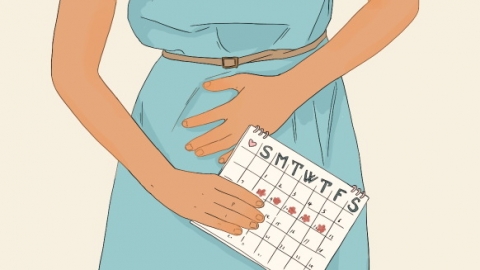What to do if the endometrium is too thin and menstruation does not occur
In general, thin endometrium leading to amenorrhea may be caused by factors such as aging, excessive dieting, insufficient estrogen levels, intrauterine adhesions, and ovarian function decline. It is recommended to seek timely medical consultation to identify the underlying cause, followed by improvement under a doctor's guidance through general treatments, medication, and other methods. A detailed analysis is as follows:

1. Aging: In perimenopausal women, declining ovarian function leads to reduced estrogen secretion, resulting in a thinner endometrium and gradual cessation of menstruation, which is a normal physiological process. No forced intervention is necessary; maintaining regular作息 (作息 translates as作息 here means rest and sleep patterns), consuming soy products to supplement phytoestrogens, and undergoing regular gynecological examinations are recommended.
2. Excessive Dieting: Long-term dieting leading to insufficient intake of proteins and fats can affect hormone synthesis, restrict endometrial growth, and cause amenorrhea, accompanied by weight loss and fatigue. Normal eating habits should be resumed, ensuring adequate intake of nutrients such as lean meat, eggs, and milk. Nutritional supplements may be necessary under a doctor's guidance.
3. Insufficient Estrogen Levels: Endocrine disorders causing reduced estrogen secretion prevent the endometrium from thickening, resulting in amenorrhea accompanied by hot flashes and insomnia. Patients may follow medical advice to use estrogen supplements such as estradiol valerate tablets, conjugated estrogen tablets, and nylestriol tablets to promote endometrial growth.
4. Intrauterine Adhesions: Procedures such as induced abortion or curettage may damage the basal layer of the endometrium, causing intrauterine adhesions and preventing normal endometrial growth, leading to amenorrhea, often accompanied by cyclical abdominal pain. Hysteroscopic adhesiolysis is recommended to restore the uterine cavity's shape. Postoperative treatment may include medications such as estradiol valerate tablets, progesterone soft capsules, and aspirin enteric-coated tablets, as directed by a physician, to promote endometrial repair.
5. Ovarian Function Decline: Premature ovarian failure results in insufficient estrogen secretion, leading to a thinner endometrium and amenorrhea, often accompanied by infertility and reduced libido. Patients may follow medical advice to use hormonal regulators such as progesterone soft capsules, dydrogesterone tablets, and Kuntai capsules to improve symptoms.
In daily life, excessive dieting and frequent intrauterine procedures should be avoided, and contraceptive measures should be taken. Maintaining a positive mood and avoiding long-term mental stress are important. Appropriate physical activities, such as yoga and jogging, can improve blood circulation and hormone balance, helping to maintain a healthy endometrial condition.




